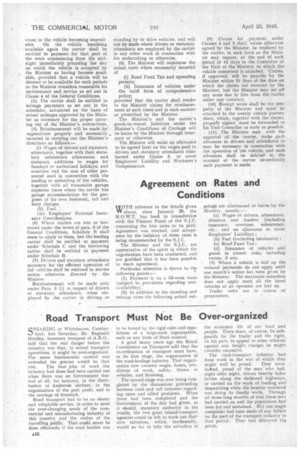Road Transport Must Not Be Over-organized
Page 20

If you've noticed an error in this article please click here to report it so we can fix it.
SPEAKING at Whitehaven, Cumberland, last Saturday, Mr. Reginald Hindley, honorary treasurer of A.R.O., said that the real danger before the industry was that, in actual transport operations, it might be over-organized. The more bureaucratic control was extended the greater would be that
risk. The best jobs of work the industry had done had been carried out when there was no Government Control at all, for instance, in the distribution of Anderson shelters, in the organization of the port pools, and in the carriage of livestock.' Road transport had to be an elastic and adaptable service, in order to meet the ever-changing needs of the commercial and manufacturing industry of this country and the wishes of the travelling public. That could never be done efficiently if the road haulier was to be bound by the rigid rules and regulations of a large-scale organization, such as any form of State control.
A good many years ago the Royal Commission on Transport saki that the co-ordination of transport must have. as its first stage, the organization of the road-haulage industry. That organization now covered wages, hours, conditions of work, safety, fitness of vehicles, and licensing. The second stage was now being cornpieted by the discussions proceeding between road and rail interests regarding rates and allied problems. When these had been completed and the Government of the day had given, as it should, statutory authority to the results, the two great inland-transport agencies could be left to work out their own salvation, which, incidentally, would go far to help the salvation of
the economic life of our land and people. There must, of course, be safeguards for the trader and the right, on his part, to appeal to some tribunal against any freight charges he might consider excessive.
The road-transport industry had done work in the war of which they might well •be proud. They were, indted, proud of the men ' who had, night after night, driven heavily laden lorries along the darkened highways, or carried on the work of loading and despatching while the bomber overhead was doing its deadly work. Through all those long months of trial these men had carried on and the population had been fed and sustained. Not one single complaint had been made of any failure on the part of the transpcirt industry in that period: They had 'delivered the goods.




















































